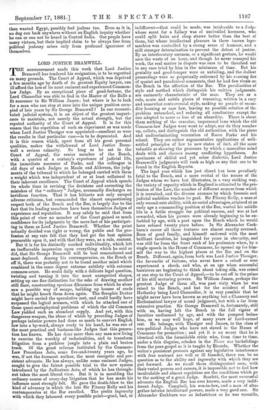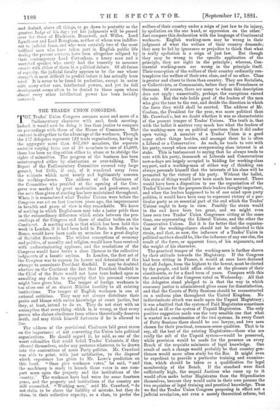LORD JUSTICE BRAMWELL. T HE announcement made this week that Lord
Justice Bramwell has tendered his resignation, is to be regretted on many grounds. The Court of Appeal, which was deprived a few months ago by death of its greatest Equity lawyer, can ill afford the loss of its most eminent and experienced Common- law Judge. By an exceptional piece of good-fortune the Lord Chancellor was able to find in the Master of the Rolls a fit successor to Sir William James ; but where is he to look for a man who can step at once into the unique position occu- pied of late years by Sir George Bramwell ? In our reconsti- tuted judicial system, it is an object of the greatest import- ance to maintain, not merely the actual strength, but the reputed authority of the Court of Appeal. It is for this reason that the repetition of such an experiment as was made when Lord Justice Thesiger was appointed—excellent as were the results in that particular case—is to be deprecated. And it is this reason which, apart from all his great personal qualities, makes the withdrawal of Lord Justice Bram- well a serious calamity. So long as he sat in the Court of Appeal, the senior member of the Bench, with a quarter of a century's experience of judicial life, the immediate successor of Parke, and the colleague in old days of such Judges as Maule and Alderson, the judg- ments of the tribunal to which he belonged carried with them a weight which was independent of or at least collateral to their inherent excellence. The Court of Appeal which spends its whole time in revising the decisions and correcting the mistakes of the " ordinary " Judges, necessarily discharges an invidious function. That it has hitherto not only escaped adverse criticism, but commanded the almost unquestioning respect both of the Bench and the Bar, is largely due to the fact that its leading members have been themselves Judges of experience and reputation. It may safely be said that from this point of view no member of the Court gained so much confidence for its judgments by the mere fact of his participat- ing in them as Lord Justice Bramwell. Whether the point actually decided was right or wrong, the public and the pro- fession at any rate felt that they had got the best opinion procurable upon it, and with that they were, as a rule, content. But it is for his distinctly marked individuality, which left an ineffaceable impression upon everything which he said or did, that Sir George Bramwell will be best remembered and most deplored. Among his contemporaries, on the Bench or off it, there was probably not to be found another mind which combined in the same degree extreme subtlety with extreme common-sense. He could dally with a delicate legal question, twisting and turning it into the most unexpected shapes, setting up one fine distinction for the sake of drawing another still finer, constructing specious dilemmas from which he alone saw a possible way of escape, building up houses of cards that he might knock them down again. The Seraphic Doctor might have envied the speculative zest, and could hardly have surpassed the logical acumen, with which he attacked one of those quasi-metaphysical problems of which the old Common Law yielded such an abundant supply. And yet, with this dangerous weapon, the abuse of which by preceding Judges of perhaps inferior powers had done so much to convert English law into a by-word, always ready to his hand, he was one of the most practical and business-like Judges that this genera- tion has known. He has done more than any man now living to exorcise the worship of technicalities, and to transform litigation from a pathless jungle into a plain and beaten track. Of the great reforms instituted by the Common- Law Procedure Acts, some five-and-twenty years ago, he was, if not the foremost author, the most energetic and per- sistent advocate. He has always, unlike some eminent Judges, sought to give the fairest possible trial to the new system introduced by the Judicature Acts, of which he has through- out taken the most liberal view. But it is in moulding the ordinary course of every-day litigation that he has made his influence most strongly felt. He gave the death-blow to the kind of advocacy in which the late Sir Fitzroy Kelly and his contemporaries at the Bar excelled. The prolix ingenuity with which they laboured every possible point—good, bad, or indifferent—that could be made, was intolerable to a Judge whose scent for a fallacy was of unrivalled keenness, who could split hairs and chop straws better than the best of them, but whose intellectual pleasure in these barren logo- machies was controlled by a strong sense of humour, and a still stronger determination to prevent the defeat of justice. By an interlocutory sarcasm, or a significant gesture, he would save the waste of an hour, and though he never scamped his work, the real matter in dispute was sure to be threshed out in any case tried by him in the minimum of time. But his geniality and good-temper were so unfailing, and the dullest proceedings were so perpetually enlivened by his running fire of quaint and paradoxical comments, that he had few rivals on the Bench in the affection of the Bar. The peculiarities of style and method which distinguish his written judgments, are eminently characteristic of the man. They are as a rule, acute and subtle pieces of reasoning, written in a racy and somewhat controversial style, making no parade of recon- dite learning or case law, leaving no possible solution of the problem untouched, and reducing all conclusions except the one adopted to more or less of an absurdity. There is about them nothing of the oracular, impersonal tone which the old Common-law Judges were wont to adopt, nor do they number up, collate, and distinguish the old authorities, with the pious and undiscriminating veneration of Baron Parke and his school. They are rather argumentative applications of well- settled principles of law to new states of fact, all the more valuable as showing the processes by which a masculine mind deals with and chooses among conflicting hypotheses. As specimens of skilful and yet sober dialectic, Lord Justice Bramwell's judgments will rank as high as any that are to be found in the English Reports.
The legal year which has just closed has been peculiarly fatal to the Bench, and a mere recital of the names of the Judges whom we have lost illustrates, in a very striking way, the variety of capacity which in England is attracted to the pro- fession of the Law, the number of different sources from which it is recruited, and the diverse avenues by which forensic and judicial ambition reaches its goal. Sir Fitzroy Kelly, a man of only second-rate ability, with no social advantages, attained at an early age a commanding position at the Bar, wasted his middle life in a futile struggle for political success, and was at last rewarded, when his powers were already beginning to be en- feebled by age, with a post upon the Bench which he would have refused twenty years before. In Sir Alexander Cock- burn's career all these features are almost exactly reversed. Born of good family, and himself endowed with the most brilliant faculties, he languished for years in obscurity, and was still far from the front rank of his profession when, by a single speech in the House of Commons, he opened up for him- self the way to the highest places at the Bar and on the Bench. Different, again, from both was Lord Justice Thesiger, the favourite of fortune, who never knew a rebuff or ever experienced a check, and who, at an age when successful barristers are beginning to think about taking silk, was raised at one step to the Court of Appeal,—to be cut off in the prime of his still maturing powers. Sir William James, perhaps the greatest Judge of them all, was past sixty when he was raised to the Bench, and but for the accident of Lord Hatherley being Lord Chancellor, it is very possible that be might never have been known as anything but a Chancery and Ecclesiastical lawyer of sound jndgment, but with a far from extensive practice. Sir George Bramwell is, fortunately, still with us, having left the Bench in the full vigour of faculties undimmed by age, and with the prospect before him, as we may well hope, of many years of hard-earned rest. He belongs, with Thesiger and James, to the class of non-political Judges who have not slaved in the House of Commons for promotion ; and yet it is no secret that he is identical with the formidable critic who, from time to time, under a thin disguise, rebukes in the Times our backslidings from the pure gospel as it is taught by Ricardo. Whether the writer's persistent protests against any legislative interference with free contract are well or ill founded, there can be no question as to the ability and ingenuity with which they are put forward. As we recall these distinguished men, with their varied powers and careers, it is impossible not to feel how incalculable and almost capricious are the conditions which go to the making of a great Judge. Scarlett, the most successful advocate the English Bar has ever known, made a very indif- ferent Judge. Campbell, his son-in-law, and a man of alto- gether inferior intellectual powers, made a very good one. Sir Alexander Cockburn was as industrious as he was versatile, and desired, above all things, to go down to posterity as the greatest Judge of his day ; yet his judgments will be passed over for those of Blackburn, Bramwell, and Willes. Lord Lyndhurst and Lord Brougham, neither of whom was indiffer- ent to judicial fame, and who were certainly two of the most 'brilliant men who have taken part in English public life during the present century, have been altogether eclipsed by -their contemporary Lord Cottenham, a heavy man and a ivretclied speaker who rarely had the temerity to measure swords with either of them in a political debate. Of all forms -of capacity, the judicial faculty appears to be the one whose strength is most difficult to predict before it has actually been tried. It is never to be found in perfection, except in union with many other rare, intellectual powers, and yet its full -development seems often to be denied to those upon whom almost every other intellectual power has been lavishly bestowed.































 Previous page
Previous page